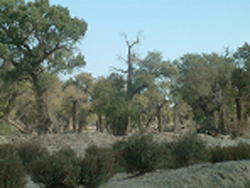
Using remote sensing and GIS technologies, a research team led by Prof. Wang Ranghui from the CAS Xinjiang Institute of Ecology & Geography has made progress in their studies into fragile ecological and environmental settings of the inland river basin in arid region.
Based on years' research, Prof. Wang and his colleagues unveil the course of development of unique terrestrial ecosystem representatively in the form of mountain, oasis and desert in west China's arid region. The ecosystem is undergoing a series of complicated changes due to natural and artificial influences, says Prof. Wang.
Starting with the water formation, transformation and consumption, the researchers have been working on the interactions between the factors important to the three forms of the terrestrial ecosystem, and the characteristics of their spatial-temporal changes. They believe that it will be of theoretical and practical importance to uncover the laws of eco-changes in arid climate and to improve the research method system of the oasis ecology and of the ecological construction in the arid zone on a large scale.
Prof. Wang has devoted his researches to theoretical frontiers of ecology for many years according to national vital-important environmental problems, dealing with such issues as the ecological risk and benefit assessment as well as the ecological value and security. Taking the Tarim River Basin as an example, Prof. Wang and his colleagues demonstrated the characteristics and laws of the eco-fragile environment in the drainage areas, and established a criterion system and worked out an eco-fragile index (EFI) in the light of the regional diversity of natural resources and eco-environment.
On the basis of ecological regionalization, the researchers carried on the quantitative assessment of ecological fragility, and divided the grade of fragility in the drainage areas of the Tarim River's three headstreams namely Aksu, Yerqiang and Hotan rivers as well as the upper, middle and lower reaches of its mainstream. They found that the ecology condition of the lower reaches of the Tarim River was serious. Viewed from the theory of dissipative structure and system entropy, Prof. Zhang put forward a general mode of ecosystem regulation to enrich and improve the theoretical system of restoration ecology.
Sensitive and fragile ecological environment is caused by an unbalanced distribution of ecological system substance and energy in a specific geographical setting. For instance, in a continental river drainage region in arid zone, the particular natural conditions and human activities is largely to blame for the local fragile ecology and environment. The current research on the causes, forms, spatial-temporal characteristics and restoration approaches is far from adequate, Prof. Wang points out. Therefore, to carry out a scientific appraisal towards the fragile environment will significantly promote the conservation of the ecological resources and environment and also provide guidance for the agrarian management, rational utilization of resources and sustainable development in the fragile zone.





